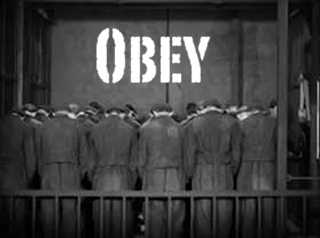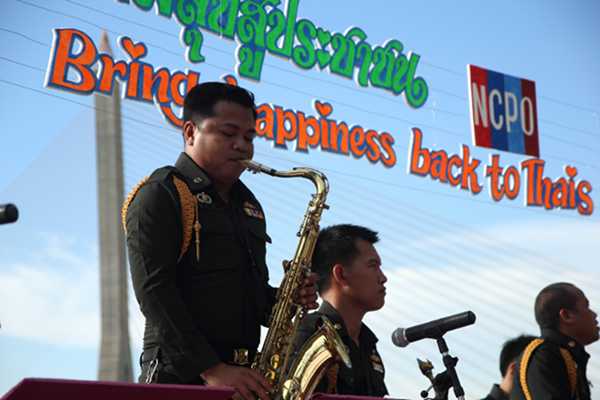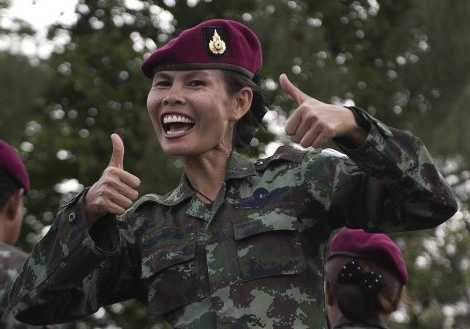
Learning to love your enslavement
Throughout history, the power of the state is claimed by the victor of violent struggle, and is maintained by the threat of violence.
 But to prosper, military might must join forces with the wealthy mercantile classes. The governing body formed by this ruling class of
might and money may be fronted by the military, the mercantilists, or by a separate class of counsels that pursues the interests of the
ruling class, while also buffering the ruling class from interaction with the lowly ignorant public.
But to prosper, military might must join forces with the wealthy mercantile classes. The governing body formed by this ruling class of
might and money may be fronted by the military, the mercantilists, or by a separate class of counsels that pursues the interests of the
ruling class, while also buffering the ruling class from interaction with the lowly ignorant public.
While might and money are necessary for the ruling class to prosper, they are not sufficient. Further pursuit of the interests of the ruling class - acquiring more power and wealth (i.e., more might and money) - requires the active participation of the public as workers, soldiers, and taxpayers. The threat of violence achieves dull involuntary public participation but, for sincere committment, other forms of motivation are required.
So, to effectively govern, the ruling class of might and money also needs to to instill myths - narratives and belief systems that motivate public committment to serve the ruling class - using religion (both denominational and civil), philosophy, and the arts to sanctify state rule, create a national identity, and unify citizenry with shared social values like loyalty and self-sacrifice for the good of the state. The power of myth ensures that the public remains ignorant of their own interests, and loyally serving their rulers.
This combination of might, money, and myths enables a tiny few to successfully rule over the multitudes.
In established states, this coalescence of might, money, and myths occurred long ago, and only the bureaucracy formed by the counsel class is now apparent to the casual observer, as the myths have been internalized and are now regarded as the result of individual choice rather than social conditioning. But when a military overthrows a civilian government in order to directly take charge of the government, we are provided a contemporary look at the process of the formation of the state. In the first phase we see the raw violence (or threat of violence) that is at the foundation of all states. Then comes negotiation with any sectors of wealth that were not initially privy to coup planning. Finally, and most importantly, the new junta must respond to the challenge of winning public acceptance of the new rule. The junta must reorient existing belief systems to the new regime, as well as create new forms of propaganda when necessary.
Freedom's Home: The People's Democratic Republic of Draconia
One of the most absurd aspects of contemporary authoritarian regimes is the attempt to disguise their authoritarian nature.
It often starts with the state being given an official name that sounds anti-authoritarian. Unlike well-established old-school autocracies, like Kingdom of Saudi Arabia, Kingdom of Swaziland, or Sultanate of Oman, whose names parade their despotism with majesty, modern autocracies are compelled by our era to operate under names that cloak their true nature. Some examples:
Democracy index by country (2015)
[compiled by The Economist, extracted from Wikipedia]| Name | Rank (1=best, 167=worst) | Category |
|---|---|---|
| People's Democratic Republic of Algeria | 118 | Authoritarian |
| Federal Democratic Republic of Ethiopia | 123 | Authoritarian |
| People's Republic of China | 136 | Authoritarian |
| Democratic Republic of the Congo | 144 | Authoritarian |
| Lao People's Democratic Republic | 155 | Authoritarian |
| Democratic People's Republic of Korea | 167 | Authoritarian |
Junta-speak
If the military junta does not rebrand the entire country, its perception management operations are limited to the regime. Nevertheless, the same tendency to attempt to disguise the true nature of the regime is in full effect. Some examples:
Junta Names
[ from Foreign Policy]| Year | State | Name |
|---|---|---|
| 1969 | Somalia | Supreme Revolutionary Council |
| 1980 | Liberia | People’s Redemption Council |
| 1981 | Poland | Military Council of National Salvation |
| 1988 | Myanmar | The State Law & Order Restoration Council |
| 2014 | Thailand | The National Peace & Order Maintaining Council (later changed to "National Council for Peace and Order" or "NCPO") |
But despite a junta's best efforts at the Restoration of the Supreme Order of Salvation and Redemption, some elements of society may still need supplemental conceptual reorientation.
Prachatai English reports that Thailand's current military junta has been all but consumed by the formidable task of rectifying the public's perception of unfavorable aspects of the regime. The article includes these samples of the junta's work:
A Glossary of Terms Used by Thailand's Military Junta
[ from Prachatai English and other sources]- Transition period
- Whenever the junta faces public criticism, it usually repeats this term to remind the public that this is not a normal political climate where people can freely express their ideas.
-
“This is a transition period. There will be a lot of time to talk about freedom after the charter draft is ratified. We’re now in need of peace and order. So don’t ask me again. If anyone breaches the law, I will catch them all,” Prawit Wongsuwan.
- A 99.99 per cent democracy
- On 23 March 2015, Prayut Chan-o-cha, the junta head, accepted that Thailand under the junta regime is not fully democratic. However, compared with the political situation in neighbouring countries, he said, Thai politics was far better and could be called a 99.99 per cent democracy.
-
“Our country nowadays is 99.99 per cent democratic. I never prohibit anybody from criticizing me, just don’t oppose me. If you were in other countries, you would be probably in jail or executed by shooting,” said Prayut.
- Influential figures
- On 29 March 2016, the junta issued NCPO Order No. 13/2016 which grants the military police-like powers to crack down on local mafia and ‘influential figures’ across the countries. The order immediately raised international concerns since it is equal to extra-juridical power... When it came into practice, the public increasingly condemned the order since the so-called ‘influential figures’ who were prosecuted under the order are mostly junta opponents including community rights advocates, human rights defenders, and social activists.
-
“Currently I am terrified of the accusation of unwittingly being a Mafia or influential figure,” said Anan Thongmani, a community leader who was alleged to be an ‘influential figure’ for opposing an eviction and demolition order of the junta.
- Attitude adjustment session
-
After the coup was staged, the junta repeatedly summoned people to military camps, mostly politicians, media personnel and
activists seen as a threat to it. The military has the power to detain them for up to seven days. Neither media nor lawyers
are allowed into the camps. It is basically arbitrary detention without charge or court oversight. The detainees are lectured by
military personnel about the necessity of having the junta in power.
But the junta claims that is just ‘attitude adjustment’ which is necessary for those who might misunderstand the junta’s ‘goodwill’ and direction. -
From Time magazine:
Thailand’s military government plans to detain anyone uttering remarks that “damage the nation and cause conflicts” for up to a week for re-education, a senior junta member has said.
General Prawit Wongsuwan said critics would be summoned to talk with officials for “attitude adjustment” each time they offended the junta, according to the Bangkok Post.From AHRD:
The military on Sunday the 1st February issued a letter summoning Peerat Bunrit, one of the leaders of Southern Peasants’ Federation of Thailand (SPFT) from Chai Buri District of Surat Thani Province in southern Thailand, to a so-called ‘attitude adjustment camp’ for three days.
The summons stated that in order to create a good environment conducive to returning happiness to the Thai people, the Surat Thani army command in compliance with the National Council for Peace and Order (NCPO) would like to summon Peerat to attend ‘attitude adjustment’ for three days. - Talk for a better understanding
-
(See attitude adjustment)
When the term ‘attitude adjustment’ gained a negative connotation, the junta said that they preferred the term ‘talk for a better understanding’, although the form of detention is pretty much the same.
-
From Anadolu Agency (Turkey):
Local media on Wednesday reported junta chief-cum-Prime Minister Prayuth Chan-ocha as saying that critics of the regime had so far failed to grasp the goverment's take on Thailand.
“In the past, critics were summoned to come and undergo ‘understanding’ but when they went back their behaviour was unchanged” the 62-year-old military general told the Bangkok Post.
“So we need to have a course to train and educate them about ethics and morality as well as good governance, so they will no longer criticize the government."
On Tuesday, Deputy Prime Minister Gen. Prawit Wongsuwan, the de facto number two in the National Council for Peace and Order (NCPO) -- aka the junta, threw his voice behind the plan.
The 70-year-old said that the previous “attitude adjustment sessions” – as was called the temporary detention of the regime’s critics in military camps – had been not successful “because those who underwent the session still expressed their thoughts once released”. - Coffee talk
-
In some cases, the junta authorities, mostly soldiers, have approached individuals, including journalists, academics and
politicians, who have criticized the junta regime. This is an alternative form of intimidation since an official summons for
attitude adjustment usually triggers public outrage.
Generally, such visits take place in a public cafe or restaurant and the military will treat its guests to coffee or tea. Therefore, the junta always says that what they do is not intimidation, but rather just a chilling ‘coffee talk’. -
“Although they (the junta personnel) treated me well and politely, it is anyway ‘polite’ intimidation. It makes me feel that the freedom of expression and criticism against the government which we used to have under elected governments has gone,” said Pravit Rojanaphruk, a senior reporter who was invited to a so-called coffee talk with the military.
The Happy Junta


Along with the attempt to cloak the junta's nasty bits, the Thailand junta also launched a program to win hearts and minds, by tapping into conventional practice, and driving home the standard message of reactionary dogma: returning to the good old days.
Mission accomplished?

How successful has Thailand's military junta's propaganda campaign been? Of course, that depends on how "success" is defined. But one anomaly in the Prachatai English report does suggest one possible way to measure success, when it claims:
The term “attitude adjustment” was the very first example of newspeak by the junta.
This claim suggests that the junta's official name, National Council for Peace and Order (whose acronym, NCPO, was used three times in the article), was either not considered newspeak or unintentionally overlooked by the author. Either case could be viewed as a form of acceptance of the core rationale given for the coup, and thus the first step towards transforming the junta from lawless thugs to "People’s Redemption" and "National Salvation". And even active opponents of the junta are not immune to this process of gradual normalization of the absurd - a key part of the process of the formation of the state.
This is how we learned to love our enslavement.
